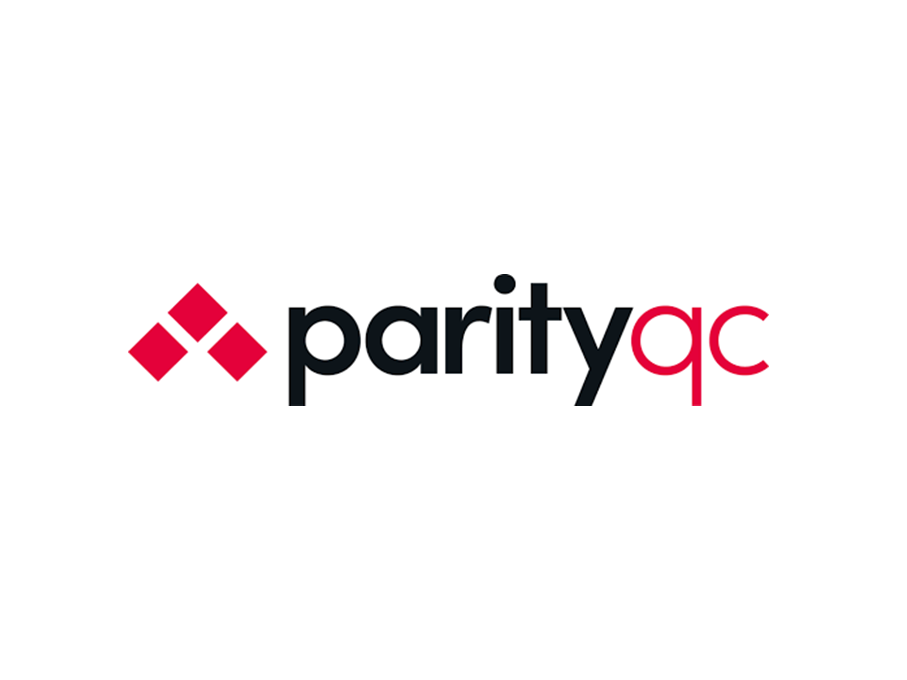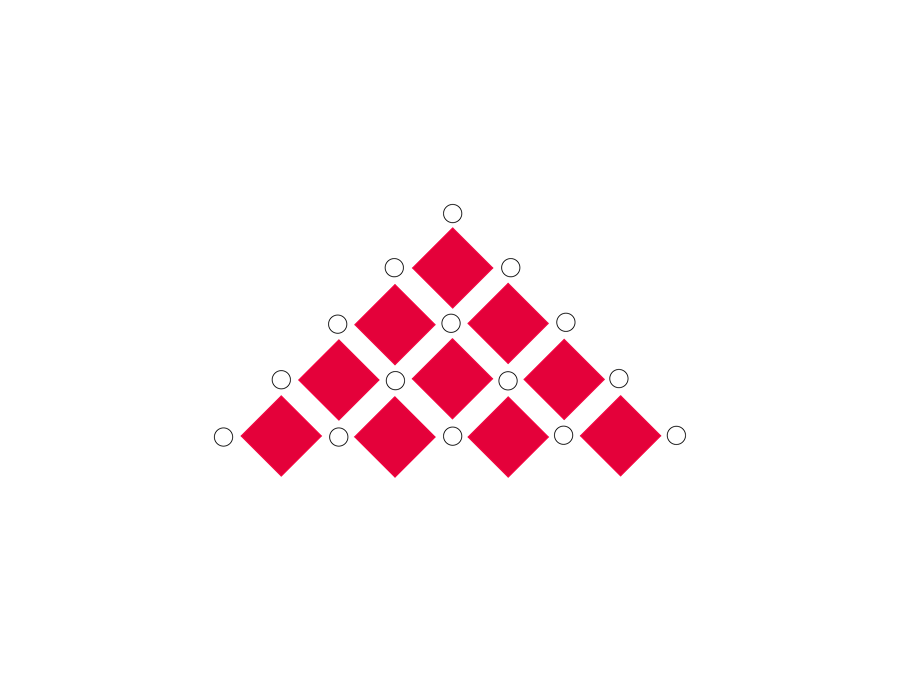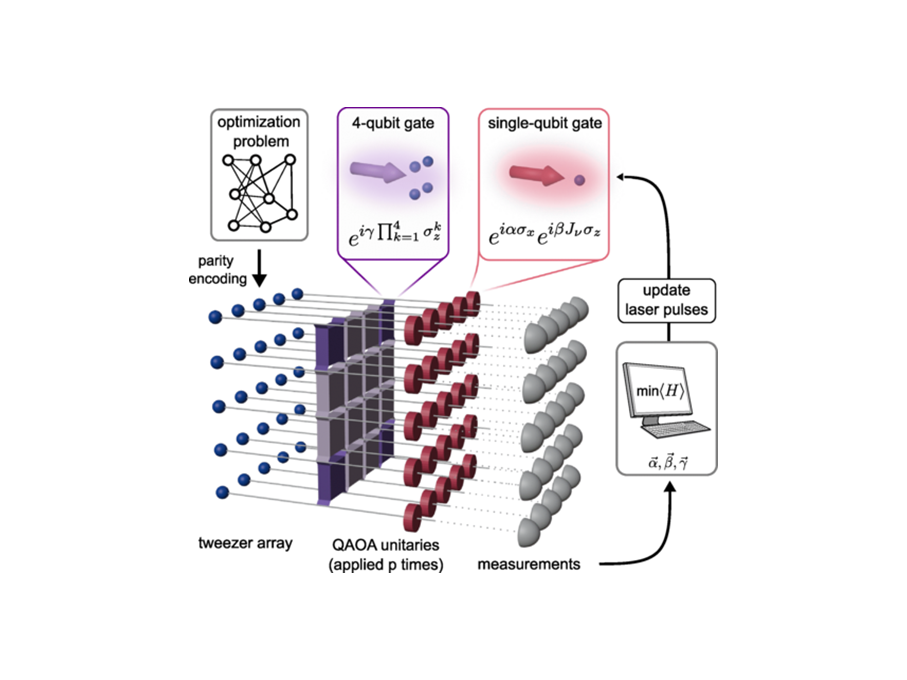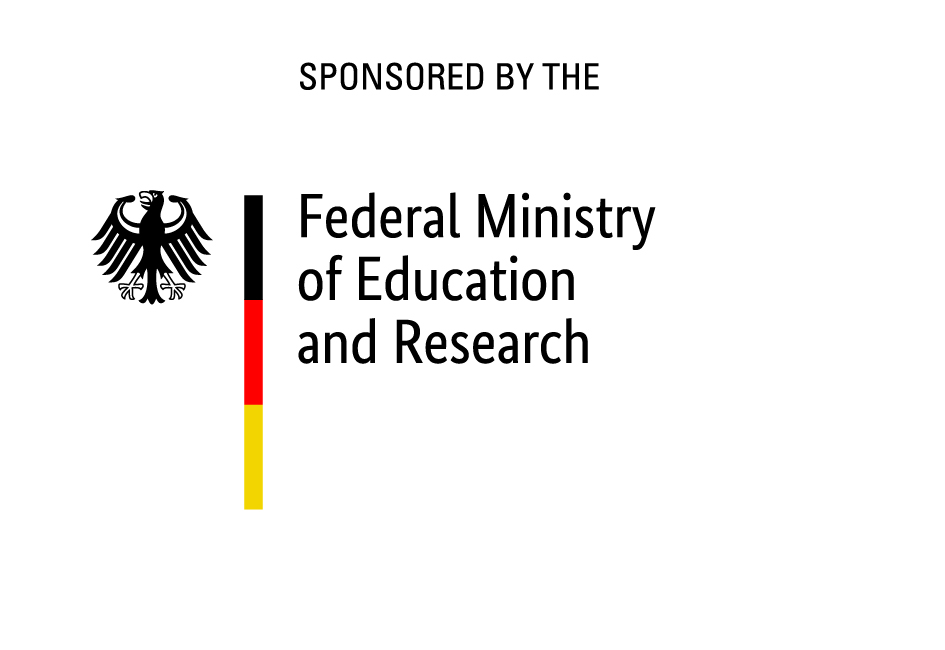ParityQC
Quantum Optimization with Neutral Atoms

Role in the consortium
Our team is responsible for developing a platform-specific compiler, which allows for an efficient and highly parallelizable solution of optimization problems on neutral atoms quantum computing. For this purpose, multiqubit-gates for Rydberg atoms are developed in close collaboration with our partners.
What are the goals?
- Develop multi-qubit interactions for Rydberg atoms to implement the ParityQC Architecture natively
- Investigate the dominant Rydberg-specific noise sources for multiqubit-gates
- Improve the QAOA-Algorithm in its Parity formulation to incorporate constraints of the optimization problem easily
- Develop a hardware-specific compiler for optimization problems as a plugin for the operating system ParityOS
How do we plan to achieve that?
Based on the proposal "Quantum Optimization via Four-body Rydberg gates" [1] improved schemes for multiqubit gates will be co-designed together with the hardware developers by using optimal control methods and in-depth numerical emulation of the gates, which takes into account the Rydberg-specific noise sources. The best candidates of the multiqubit-couplers will then be realized experimentally.
A hardware-specific compiler, which exploits the developed multiqubit-couplers, will be developed for solving general optimization problems. Constraints of the optimization problem will be included very efficiently in the Parity formulation of the QAOA-algorithm by taking advantage of physical exchange terms. The compiler will be provided as a hardware-specific plugin of the operating system ParityOS, which is an existing software that encodes optimization problems in the Parity Architecture on quantum computers.
Check out this video to learn more about the concept behind ParityOS and how you can gain access to it.
[1] Clemens Dlaska et al., Quantum Optimization via Four-body Rydberg Gates. Phys. Rev. Lett. 128, 120503 (2022)

Parity architecture

Rydberg parity quantum approximate optimization algorithm protocol [1].
Open positions
Join us! We are always looking for talented and motivated people to join our team.
We are a company working in one of the most exciting emerging technology fields. There are no long-time proven concepts on what we are doing – we need to invent everything from scratch, and we are therefore able to shape the future of quantum computing. We are pioneers in this field and develop the blueprints for the upcoming generations.
Among the tasks that our team works on, there are:
- development of our compiler, which is at the core of our software ParityOS
- development of algorithms and quantum hardware proposals using the ParityQC Architecture
- analysis and investigation of real-world use cases for quantum computation, and the development of mathematical models to best encode them onto quantum hardware using the ParityQC architecture
- deployment and maintenance of the backend for our Software-as-a-Service solution
- business operations, from finance to marketing and business development
We currently have a number of open positions to join our team. If you would like to find out more, please visit out careers page here.
Team
ParityQC introduces a new paradigm on how to build scalable and fully programmable quantum computers to solve optimization problems. We develop blueprints for quantum computers based on our patented ParityQC Architecture, as well as the appertaining operating system ParityOS. Our belief is that the co-development of hardware design and quantum algorithms leads to a perfectly aligned quantum computer for solving optimization problems. The ParityQC Architecture is fully programmable, parallelizable (no SWAP gates), and scalable. It can be built with a greatly reduced complexity, easy qubit control and independently from the problem, providing unique advantages for all currently available hardware platforms and both methods (digital and analog). Our compiling method has been shown to solve industry-relevant problems earlier than current approaches. Our research focuses mainly on the application of the ParityQC architecture to different platforms and with different methods. Our recent publications focus on universal quantum computing [2], quantum optimization via four-body Rydberg gates [3], and the modularity of quantum chips [4].
[2] M. Fellner at al., Universal Parity Quantum Computing. Phys. Rev. Lett. 129, 180503 (2022)
[3] Clemens Dlaska et al., Quantum Optimization via Four-body Rydberg Gates. Phys. Rev. Lett. 128, 120503 (2022)
[4] K. Ender et al., Modular Parity Quantum Approximate Optimization. PRX Quantum 3, 030304 (2022)
Anton Flir
Director of Operations Germany

As Director of Operations Germany, Anton Flir creates the environment for a high-performance team. In this role he is responsible for the project management including all administrative aspects. After completing his theses on ultracold quantum gases, Anton gained more than 10 years of experience in setting up and leading a business unit. As CTO he was responsible for the creation and the management of IP and the successful conversation of knowledge into competitive products.
Christian Ertler
Head of Technology Partnerships and Senior Quantum Scientist

Christian Ertler is the Head of Technology Partnerships at ParityQC Germany and brings in his experience as a research coordinator and project manager of large-scale research projects gained at the German Aerospace Center DLR. Christian worked for several years as a PostDoc in the field of dynamics of open quantum system and spintronics at the University of Regensburg and University of Graz.
Stefan Rombouts
Senior Quantum Software Engineer

Trained as a computational quantum physicist at the University of Ghent, Stefan Rombouts focused his research on the simulation of quantum systems on classical computers. After more than a decade in academia in places as diverse as Aarhus, Los Alamos and Madrid, he switched trades to become CTO of an online tour operator in the tourism sector. The pandemic convinced him to return to the realm of quantum, leading the development of the ParityOS cloud services at ParityQC.
Federico Dominguez
Quantum Software Engineer

Federico has experience in solid-state Nuclear Magnetic Resonance, investigating decoherence and quantum control of large systems. At ParityQC, he is involved in the formulation of use cases and co-design tasks, looking for the best way to implement the ParityQC Architecture in different experimental platforms.
Contact persons
Scientific questions:
Anton Flir a.flir(at)parityqc.com
Christian Ertler c.ertler(at)parityqc.com
Stefan Rombouts s.rombouts(at)parityqc.com
Federico Dominguez f.Dominguez(at)parityqc.com
Open positions:

Funding acknowledgement
Sponsored by the Federal Ministry of Education and Research, grant number 13N16080